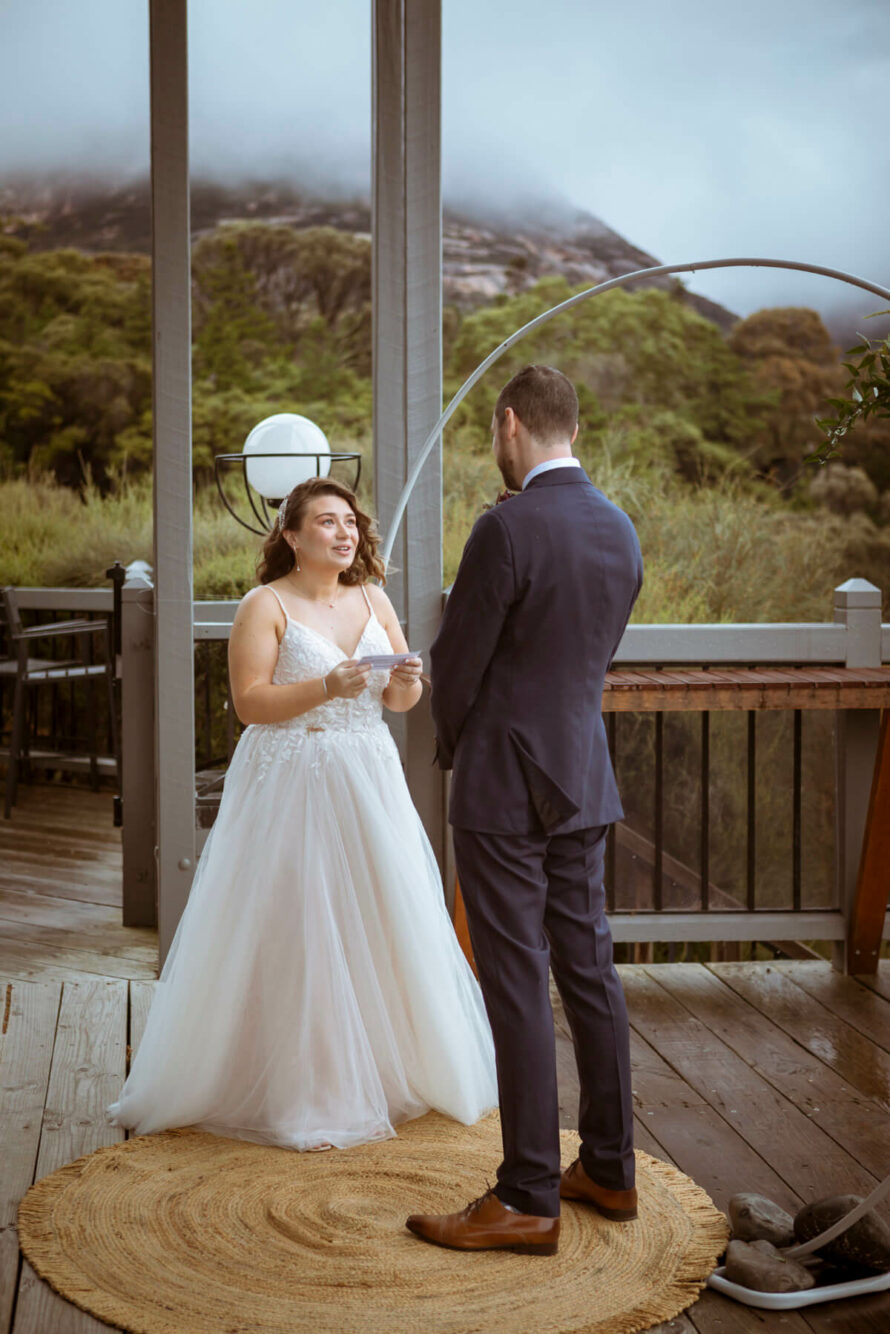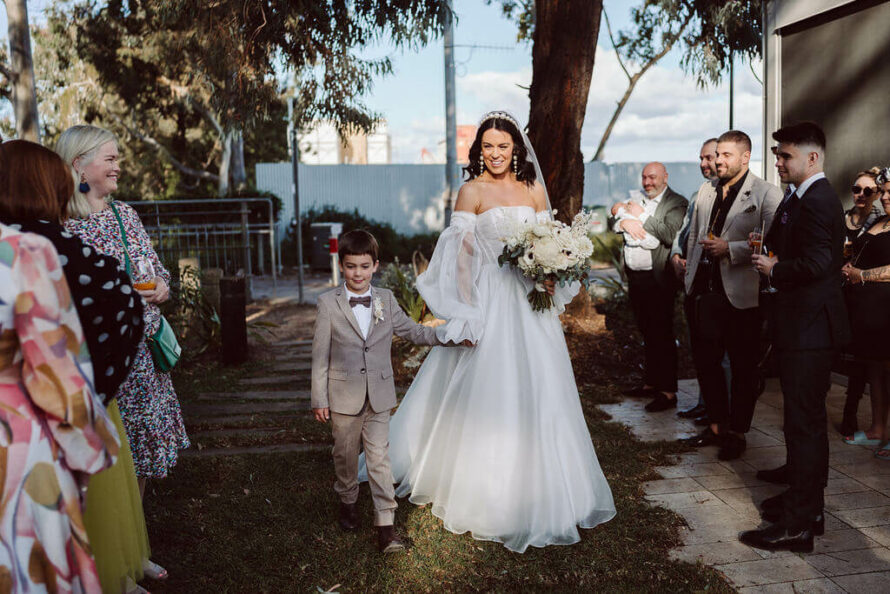James Anderson spends his days working behind a camera. But his story is one that would make for a great TV story.
The Melbourne man, director of Turbo Productions, is known for his winning ways with wedding videography. But he actually started out in a different kind of broadcasting.
“I was fortunate enough to work in commercial radio for many years,” says James, who also offers photography services and has covered close to 1000 weddings everywhere from Victoria, Queensland and New South Wales to Tasmania and Canberra.
“I actually broke into the industry through Sun FM at Mt Buller and then moved into capital city radio as an announcer for Triple M Melbourne and Sydney, as well as the host of the nationally syndicated Planet Rock show.”
It was a period of big success, big stars and big adulation, and one that earned him the nickname of Turbo. But after reaching No. 1 in the ratings, he decided it was time for a change. And not just to another network, but to another industry and another country.
“Video production had always been my second love,” James explains. “And the opportunity came up to take on the role of video manager at the International Olympic Gymnastics Training Centre in the US. It was a fantastic catapult to my career.”
The centre, in Texas, is where America grooms its young stars for glory on the international stage. And it also helped add another level of polish to his skills, from the ins and outs of working with children to post-production specialities.
“One thing it particularly taught me was to focus on candid moments,” says James, who is acknowledged for his unobtrusive, fly-on-the-wall approach. “It’s about focusing not on staging moments but on capturing the real essence of the day.”
It’s a lesson he brought back to Melbourne and to Turbo Productions, which specialises in videography and offers such services as pre-wedding shoots, same day edits (where you can play the ceremony at your reception) and slow-motion video booths.
Another increasingly popular service is live streaming, which draws on technology to broaden the reach and appeal of weddings. We asked James, who specialises in setting up and working multiple cameras for depth of footage, to talk us through exactly what this involves.
What is live streaming?
In a nutshell, live streaming is broadcasting your wedding over the internet so people can follow the action from anywhere in the world. Your friends and relatives are simply given a website link to click on the big day and this allows them to watch the wedding ceremony as it unfolds.
What are the nuts and bolts of how live streams operate?
Without getting too technical, a high-definition video camera and a series of microphone feeds are hooked up to the internet to create a live stream of action. This is done through the 3G/4G mobile data network. At Turbo Productions, the live stream is hooked up to the primary camera, which means viewers at home shadow the videographer as he roams. They see the same special moments he does, such as outside the church when the bride arrives, the vow exchange and beyond. Wherever the camera operator goes, the stream goes with him. It’s the next best thing to actually being there.
How do they work security wise so they’re restricted to the intended audience?
Password protection is available to couples who want to keep their day private. A website link is set up prior to the day and sent via email to the future bride and groom. They can then share the link as broadly, or as narrowly, as they would like. Some people share it through social media, websites and/or email and we have had viewers from as far away as Macedonia, the US and Kuala Lumpur tuning in.
How do you make sure you capture the sound properly?
We use lapel mikes on both the groom and the celebrant. While the visual image is important, you cannot underestimate the importance of the audio component. We pride ourselves on capturing crisp audio, so you can hear all of the vows, the speeches and the key messages of the day.
Do live streams stay online after the event?
The broadcast only lasts for the length of the event or ceremony, but it then remains on the link afterwards so people can tune in when it suits them. It is available for immediate playback afterwards (like a DVR player) and includes such features as fast forward and rewind so you can find and focus on your favourite bits. We often find we get an influx of viewers the day after the wedding with people who missed the original viewing time, or attended the wedding and want to catch up on bits they might have missed.
Can they be saved and/or downloaded?
Live streams can be downloaded. Our packages also encompass all digital files, so they are featured in the finished product.
Can you live stream any and all weddings, or just those in a church or other building with existing power supply?
Because you only need a high-speed internet connection or 3G/4G data coverage, live streaming isn’t just restricted to inside buildings. For example last year, we broadcast the wedding of Marcus and Winnie from the gardens of the Heide Museum in Bulleen. Winnie was able to include her family in Malaysia in the proceedings, so that was a lovely extra aspect to their celebration.
Are they used just for ceremonies or for receptions as well?
It really depends on the couple. We have done both, but they are definitely more popular for the ceremony. They’re also a great way to share a destination wedding with your friends and family.
Are they something that’s growing in popularity?
Definitely. And we think the reason is twofold. Firstly, brides and grooms are becoming more aware of social media and technology and the opportunities they provide. We have seen an upsurge in Facebook sharing and posting and some of our couples have hundreds of their friends visiting our photos and footage via Facebook.
Live streaming is another way to tap into this interest. Secondly, modern brides and grooms often have family overseas or interstate who can’t make the event, or family members who aren’t able to travel because of an ailment or illness, so live streaming allows them to still share the big day with these people.
To give you an example, we had one Sydney couple, Kirby and Mitchell, who wanted a country wedding. But this meant Kirby’s older grandparents weren’t able to make the trip. To ensure they didn’t miss out, we set up a live stream for both the ceremony and reception. The reception was made even more special for the grandparents when both Kirby and Mitchell snuck up to the camera with special messages just for them.
Are there any other advantages to a live stream?
For starters, they’re a great way to include people in your big day while still keeping your actual guest list quite intimate. They also let brides and groom reply, rewind and recap the day afterwards, which they love, considering it seems to always slip by in a nanosecond for them. It can also help with the budget as it’s a great way to include interstate and overseas guests without the cost of an airfare.
Overall then, why would you encourage couples to consider live streaming their wedding?
It’s a lovely way of giving back to friends and family. One of our couples is keeping it a surprise until closer to the date and will then give it to their family as a surprise gift. It’s just a really nice way of sharing your wedding with everyone who’s important to you and, ultimately, the chance to make and share great memories is one of the best things about the role of technology in a wedding.


